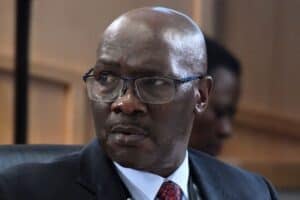Judge John Hlophe's career was not devoid controversy, according to the DA, while 296 MPs voted for the removal of retired Judge Nkola Motata.

Western Cape Judge President John Hlophe and retired Gauteng High Court judge Nkola Motata have become the first judges to be impeached in South Africa since the dawn of democracy.
The previous judge was removed from the bench in 1910.
Almost unanimous
Motata’s removal came during a National Assembly sitting on Wednesday after the Supreme Court of Appeal (SCA) set aside an earlier JSC decision to clear him of gross misconduct.
In an evening that saw many EFF MPs being asked to leave after causing disruption, 296 members voted for the removal of Motata, one voted against, and 13 were in abstentia.
The judge’s guilty finding related to a January 2007 incident, where Motata crashed his car into the wall of a Hurlingham home and then made racist utterances to the homeowner, Richard Baird.
In 2009, the Gauteng High Court in Johannesburg convicted Motata of driving under the influence of alcohol and sentenced him to a fine of R20 000 or 12 months’ imprisonment.
Hlophe impeachment: ‘Who judges the judges’
Hlophe’s removal was based on the recommendation of Parliament’s Portfolio Committee on Justice and Correctional Services, which handled his impeachment process after the Judicial Service Commission (JSC) found the judge guilty of gross misconduct.
The National Committee’s chairperson, Bulelani Magwanishe, spoke of the importance of the judiciary’s independence, saying courts needed to function without interference or influence from others.
“A judge bears the responsibility of upholding the independence, integrity, and authority of the court. When the very same judges are found wanting, how do we then hold them accountable? Who judges the judges?” the ANC MP said.
Magwanishe stressed that the Portfolio Committee handled the impeachment process fairly and applied its mind.
DA MP Glynnis Breytenbach said Hlophe’s career was not devoid of controversy, “both personal and professional”.
“It was the allegations of egregious misconduct that sparked this impeachment process. Hlophe had it all going for him. Exceptionally well educated, clearly extremely intelligent, [and] he had all the makings of a stellar judicial career.
“When appointed by President [Nelson] Mandela, he was the youngest judge to be appointed to the bench. Yet, he was tripped up by the lack of the most essential component of any judge, integrity. Hlophe has demonstrated amply that he possess no shred of integrity,” she said.
Breytenbach said Hlope’s removal for his “nefarious actions” was “belated”.
“It is a great indication of our Constitution and the rule of law that we have finally reached this point.”
Watch the proceedings below:
‘Exceptional legal scholar’
EFF member and former public protector Busisiwe Mkhwebane did not support Hlophe’s impeachment, labeling the move as “a concoction of deep-rooted racism in the judiciary”.
“President Hlophe, a distinguished judge and an exceptional legal scholar, is about to be the first victim of a toxic and unforgiving culture of impaling black people who dare stand up against the dominant, liberal and racist discourse in this country,” she said.
Mkhwebane said she believed there was “a lot of political interference” in the judge’s removal from the bench.
“We reject the abuse of Judge Hlophe and deem this unconstitutional behaviour.”
READ MORE: John Hlophe misconduct saga several years from reaching a conclusion
Meanwhile, IFP MP Narend Singh said Mkhwebane’s utterances “did not trump the facts”.
Singh expressed concern over the delays in considering Hlophe’s impeachment.
“The first complaint was lodged in 2008, and it’s 16 years later that we are considering this matter. However, we all know that the law must take its course, and the provisions for the appeal mechanism, which the honourable judge has used.”
Although Singh hailed Hlophe as a great judge, he said the IFP supported his removal.
Furthermore, ATM MP Thandiswa Marawu also rejected Hlophe’s impeachment, emphasising that his contributions to the judiciary and “advocacy for the decolonisation of the legal framework” cannot be overlooked.
The National Assembly then proceeded to vote after the debate, with 305 MPs agreeing to Hlophe’s impeachment.
While 27 voted against his removal, there were no abstentions.
JSC findings
The recommendation for Hlophe’s removal came after the JSC found the judge had acted improperly when he attempted to sway two Constitutional Court (ConCourt) justices in favour of former president Jacob Zuma in his 2008 bid to overturn warrants used to seize 93 000 pages of corruption trial evidence against him.
The decision of the JSC upheld the Judicial Conduct Tribunal’s findings.
Hlophe’s impeachment was then referred to the committee in 2021 and later suspended by President Cyril Ramaphosa in December 2022.






